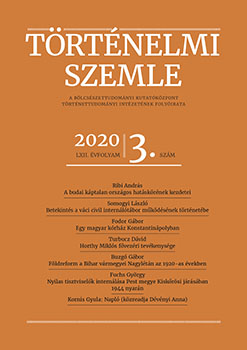Kornis Gyula: Napló
Gyula Kornis: Diary
Contributor(s): Anna Dévényi (Editor)Subject(s): WW II and following years (1940 - 1949)
Published by: Magyar Tudományos Akadémia Bölcsészettudományi Kutatóközpont Történettudományi Intézet
Keywords: Horthy Era; politician portrait; diary; memoir; Gyula Kornis; Gyula Gömbös; Pál Teleki; Miklós Kállay; Béla Imrédy
Summary/Abstract: Gyula Kornis, scholar and politician, professor of philosophy and pedagogy, secretary of state in charge of public education by the side of Kunó Klebelsberg, and first vice-president and then president of the House of Representatives, was one of the major figures of the Christian-national-conservative ideology that was a key feature of the Horthy era. The chief merit of his piece of writing, entitled „diary”, but in terms of genre rather a fragmentary memoir, which runs to a mere 35 pages, is the portraits it gives of the key political figures of the period and the author’s personal reflections. Kornis, who analyses the psyché of the politician from a scientific (psycho-historical) perspective, offers a detailed characterisation of prime ministers Gyula Gömbös, Pál Teleki and Miklós Kállay, but also gives reflections on the habitus of Kunó Klebelsberg, Bálint Hóman, Sándor Sztranyavszky, László Bárdossy and Kálmán Kánya. The politician portraits are embedded, as supplementary-explanatory excursus, in descriptions of predominantly foreign political events, which, mostly following in a chronological order, constitute the backbone of the memoir. Kornis did not aim to present his own personal history, only dealing with those details of his career that seemed relevant from a national perspective. Consequently, the most active phase of his political life, that is, the second half of the 1930s, is the center of gravity of his narrative, with a special emphasis on the history of the fall of the Imrédy administration, in which Kornis himself played a leading role, and which also signalled the end of his political career. Alongside the distorted prism caused by a personal nexus, the experience of the war years also left its footprint on the judgements of the work dated to 31 March 1944.
Journal: Történelmi Szemle
- Issue Year: 2020
- Issue No: 03
- Page Range: 497-522
- Page Count: 26
- Language: Hungarian

